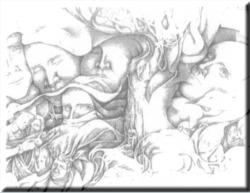We’re sending this
to all of you, "accepted" or "rejected"
this time around, and those who asked for guidelines,
to thank you for your interest and your poems
and also to explain the purposes
this magazine was meant to serve, and what
we hope for from its writers and its readers.
Back in 1996, its founder
wanted to set up some alternative
to literary fashions that seemed molded
too much by various markets, and too little
by visions of the world we’d like to make.
She’d come of age as a poet in an era
when poetry was shared with friends who sought
to see the outline of a common future,
where every one had something to contribute,
and where the challenge was not to be "better"
than fellow-bard, but rather to be true –
to speak one’s part, whatever it might be.
As time went on, she’d come to feel the need
for a “return” from modernism, seeing
that some of the Victorians had been clearer
about the nature of the poet’s calling
as speaker of community and seeker
of a “common truth” (as Paul Celan had put it
just at the last). And so the magazine
was called “The Neovictorian.” “Cochlea,”
its second name, was meant to emphasize
that poetry must address the inner ear
(not merely fashion “visual imagery”!).
The standpoints which this dual name reflected
remain in force, although the name is now
The Deronda Review. The change reflects
a wish to call attention to our ties
to one embattled particular -- Israel;
it also represents a sharpening
of focus, on the point at which Victorian
culture and that of Israel encountered.
Daniel Deronda was the final statement
of that Victorian writer – Marian Evans,
a.k.a. George Eliot -- in whose work
introspection and social criticism
were integrated most successfully.
As you will recollect, Daniel Deronda
discovers that he is a Jew, relearns
and reaffirms his Judaism, and
in the end returns to his ancestral land.
For the fashionable heroine, who suffers
from, and exemplifies, a kind of ambient
tawdriness we find all too familiar,
Deronda represents a source of values;
and we would like to hope this opening-out
of Western literature toward Jewish teaching
may yet appear prophetic. For the vision
of a people who collectively assume
responsibility for the Creation
still shines above the chaos of the present
as a model that may yet inspire renewal,
and surely as a source of inspiration
to poetry as a common enterprise
of understanding and communication.
At any rate, the poems we’ve selected
are those that seemed as if they might fit in
to such a dialogue -- that held some spark
of true experience or concern, conveyed
in words that came alive to tell their tale.
If this has struck a chord in you, we hope
to hear from you again. If we have failed
to understand your work, then please forgive us
and try again. A sample issue may
help you to find our pitch.
The issue won't
have a "bio" section, but will print
titles of books by the contributors,
also your mailing address, if you're willing
to enter into dialogue with readers
-- please let us know.
Wishing you all the best
of vision, luck and guidance, we remain
yours sincerely,
Esther Cameron, Editor
Mindy Aber Barad, Co-Editor for Israel
| |

